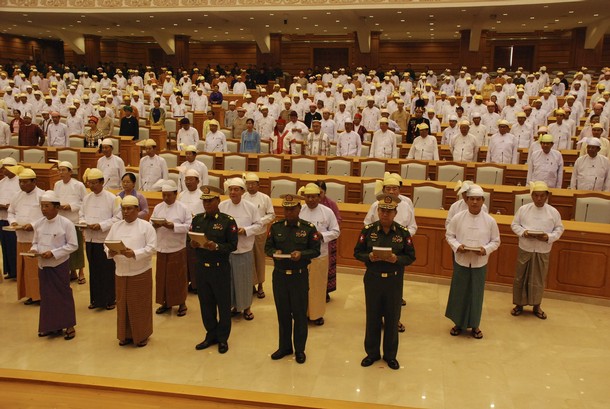Burma’s parliament could look very different after next week’s election, but a survey questioning major political parties reveals that there will still be a lack of commitment when it comes to human rights issues.
In a report titled ‘Half Empty’, the International Federation for Human Rights (FIDH), an umbrella organisation whose member groups work in more than 100 countries, questioned 19 major parties about what they intend to do once in parliament. (While the participants make up only 20 percent of the 91 parties running, FIDH said that this sampling are representative of Burma’s major ethnic groups.)
The parties’ answers – or, in some cases, their resounding silence – was not encouraging, said Debbie Stothard, FIDH’s secretary-general, during the report’s launch in Rangoon yesterday.
“There have been many assumptions that most of the political parties, especially the opposition parties who have made commitments to human rights … would have a systematic human rights policy,” Stothard said. “And we can see from this survey that that is sadly lacking.”
She declined to confirm whether the opposition National League for Democracy party, which is widely held as representing the Burman ethnic majority, took part in the survey.
“I think it would be prejudicial at this point to reveal which parties responded and which didn’t … because we are in a climate at the moment where even political candidates are not protected from serious violence,” Stothard said.
The survey’s questions covered a wide range of issues, from women’s rights and the death penalty to ethnic minority rights and abuses against religious minorities.
This final topic was so controversial that nearly half the parties, 42.11 percent, flat-out refused to answer how they plan to address discrimination facing the Muslim Rohingya minority, who in recent years have faced persecution in Burma from nationalist Buddhists.
[related]
“More troubling was the fact that several parties aligned themselves with the government’s official position that denies the existence of Rohingya as one of Burma’s ethnic groups,” the report said, calling it “alarming” that three-quarters of parties polled refuse to support a 1962 amendment that would give the Rohingya minority equal access to citizenship rights.
Also alarming was the response to the question about protecting and promoting women’s rights, said Stothard, who called the rate of parties – about half – willing to investigate allegations of rape and sexual violence committed by the military against ethnic minorities to be “deeply disturbing”.
“Less than half of the political parties that responded actually agreed that they would introduce and adopt a law on the prevention of violence against women,” she added. “This is a dangerous sign that less than half of political parties are committed to the protection of women from violence and rape.”
Most revealing was that parties failed to address issues particularly when political considerations took precedence over human rights concerns, said Andrea Giorgetta, head of FIDH’s Asia desk.
“The worst case scenario is to have another Parliament that adopts laws that disregard international standards and prioritize interests of political and economic groups over the rights of the people who elected them,” he said.
Read more DVB election coverage



